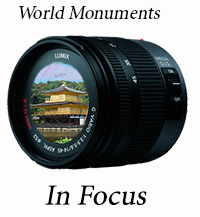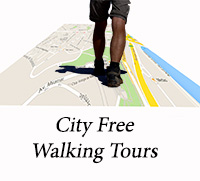If you are a hitch-hiker, you might not always remember all the drivers who gave you a lift or all the roads you found yourself on, but most certainly you will remember all the border crossings you have ever crossed on foot. Border crossings are much more than just geo-political obstacles in your way; they are transition points behind which you leave all that you have tamed during your visit in a country and once this magical barrier is crossed, you enter a completely different world in which you need to learn everything anew. The language that you’ve been used to hearing, here is unintelligible; the money in your wallet has no power anymore and the rules you’ve learnt and the local knowledge you’ve acquired are utterly irrelevant in this new land.
That’s one of the reasons why you are bound to remember all the borders you’ve crossed. The other one is the fact that every border crossing is different and you should be prepared that there is always something unpredictable to happen whenever you find yourself on this narrow strip of land dividing two countries. Therefore every border crossing has its story.
This is the story of the Laos-Cambodia border crossing.
It was the summer of 2009. We were hitch-hiking around Southeast Asia and at the time we found ourselves in Don Det in the south of Laos. Don Det is one of the numerous islands scattered across the yellow muddy Mekong River. It was beautiful, serene and almost pristine, with bamboo huts in which to sleep and electricity available only till 10pm, after which hour everything turns pitch black and you wouldn’t be able see the tip of your finger scratching your nose if you tried. There were bicycles to rent and ‘happy cocktails’ available in local bars. And there weren’t many other tourists, which made the place almost perfect!
After this idyll of a stay, we decided to move on, as we realised that without making any firm decisions we could sink into that atmosphere forever. The plan was to cross the Cambodian border on foot, which was only 25km away. We had organised our Cambodian visas in advance (not without hassle and not without paying a bribe, of course), so we were alright on that front; the only problem was that the border crossing in Veun Kham was not an official one. We’d heard that if you pay a small bribe, you’d be alright and they would let you pass, but still the anxiety grew and we didn’t have any definite idea of what might happen.
The day had come; we packed our bags and were ready to go. The boatmen weren’t our friends that day and we had to wait a long while until we finally managed to leave this stunning Mekong archipelago. On the other side of the river we found ourselves standing on a dirt road (one of many in Laos) and contemplating how the hell we were supposed to travel the 25km, given that there was absolutely no traffic.
Finally we made out a scooter approaching from the horizon. We were lucky; the driver stopped, took out his phone and called a mate. After 10 minutes there were two scooters, our Laotian friends who didn’t speak a word of English, our big rucksacks and us. We indicated where we wanted to go and off we went on the back seat on the bumpy dirt road with our two rucksacks hanging out the back. Good old Lao people, always helpful, always smiley.
This photo was also published by Travelfish on 25th April 2012.
.T
We made the best of our way to the border and when we finally got there, we bid adieu to our helpful scooter friends and with shaking knees slowly approached the wooden hut of a customs office. The chubby customs officer gave us a shrewd look from under his officer’s hat and asked us to buy the “absolutely essential” International Certificates of Vaccination, the yellow book we were well familiar with, given the fact that before setting off for the trip we had taken all the necessary vaccines and possessed this book to prove so. Without the vaccination though, the book was a mere piece of yellow paper, valued by this particular officer at ten American dollars. I felt sorry for him; the look of disappointment didn’t really suit his uniform, as we produced our filled-out ICVs from our money belts. This time, no money for you, my friend.
We walked five metres across no-man’s land and found ourselves in front of another customs officer, this time the Cambodian tougher-looking type. He was also placed in a wooden hut but was seated behind a glass protective pane that undoubtedly gave him more confidence, as he asked us for a bribe.
‘Four dollars,’ he said after having thoroughly examined our passports and visas.
‘Why?’ said I in a very similar, devoid-of-emotion type of voice.
‘Because everyone pays.’
Jon and I looked at each other, then we returned to the officer and saw a composed, cold, money grabbing bastard, the basest sort of human being, who knew as well as we did that there was no other way. We had to pay. During the whole visa preparation process all encounters with Cambodia officials had been just the same: no dollars, no entry. It seemed to be the accepted reality on this side of the line.
We paid and crossed into the other side. And on the other side we saw the continuation of the dirt road we had come from and the continuation of the jungle we had seen along the way; nothing more, nothing less, apart from a group of vans and a group of men who didn’t take their eyes off us from the moment we had crossed the border. They seemed to be lying in wait for us because as soon as we made a few steps towards them, they surrounded us demanded money. 50 dollars per person for driving us to the next town, which was around 50km away. We laughed the very idea off, walked away from them and took a position in wait for passing cars to pick us up.
We waited and waited, and waited. And waited. And there were no cars, due to the fact that it wasn’t an official border crossing and no cars were going this way. There were just us, the jungle, and the men with their vans scanning us like hungry vultures, getting hungrier with every passing hour. They tried to negotiate the price and even went down to 40 dollars per person, but we would hear nothing of it and were as tough as nails until a heavy torrential rain fell on our worried heads. The tropical type of rain, from which there is no escape. We tried to hold on to our big Chinese-made umbrella of a dazzling orange colour, which we’d acquired at a Laotian market on the way, but the downpour was so strong that the water mixed with leaves and mud started to wash out the ground from under our feet.
We couldn’t give away the fact that we were uneasy and apprehensive of what would become of us, but of course we were scared stiff. I twisted my imagination into a maze of all possible scenarios, including us coiled up in the mud sleeping up against the customs office booth or marching along the road, through the dark wet jungle, towards the next settlement. Hours past and the road remained empty. In my head I started regretting all the adventurous thoughts I’d ever had and cursed the ludicrous idea of crossing this damned unofficial border crossing.
As the rain kept unceasingly crashing against the umbrella, a ray of hope shone through the clouds; a new white van crossed the border and started heading towards us. We ran onto the road and waved at the driver to stop. It turned out to be a group of Laotian expats living in France and currently visiting their ancestral motherland. And they obviously spoke French! ‘Thanks God, we’re saved!’ I thought and hurriedly explained our desperate situation in my broken French. To my surprise they didn’t offer to give us a lift as their car was packed, but started to collect money, so that we could pay the van-men and get our ride. We couldn’t accept their kind offer, so we waved them goodbye and came back to our mud filled hitch-hiking spot.
As it was getting dark the situation started to look more grievous. We decided to speak to the van-men in order to beat the price down. Taught by experience, we never carry large amounts of money in our wallets, so we decided to show them as much as we had at that time so as to prove that there was no way we would cough up 80 dollars for a 50km ride.
‘We will pay you 20 dollars, for both of us,’ I said opening my wallet to show its content to one of them.
He only laughed and turned away.
‘But we don’t have any more!’ I tried to produce the most desperate voice I could bring myself to do.
‘When we get there, you can use a cash point and give us more,’ he was cleverer than I thought him to be.
‘We are not paying you more! We are your only potential customers today and you will have to go back to where you came from, so you might as well take us with for 20 dollars,’ there was no way we were paying more, even if we had to sleep at this lousy border crossing! I had quite made up my mind.
He went to speak to his mates, who had been scrutinising us and our luggage throughout our conversation. They seemed unmoved so we also assumed our indomitably determined faces and waited.
After some time, which seemed to us like days, they cracked and the man came back to our muddy negotiations table. They agreed to do it for 25 dollars and said they will drive us to a ‘very nice and cheap’ hotel run by their friend. One of many Southeast-Asian scams. The price suggested by them was still a massive rip off, but in those circumstances it seemed to be our last resort. Spending a night in the middle of a Laotian jungle with knee-high levels of muddy water could possibly be quite appealing to some, but at that time we rejected the opportunity.
And we were off to our first Cambodian city of Stung Treng and our Cambodian adventure was just to begin…
written by: Ania



















Pingback: Family celebrations in Southeast Asia – Part 1: wedding (Laos) | Hitch-Hikers' Handbook
Pingback: How we were tricked by an old woman in Vietnam [story] | Hitch-Hikers' Handbook